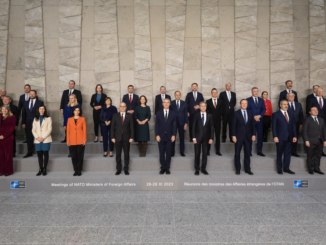
Gov.pl, CC BY 3.0 PL, via Wikimedia Commons
The reality is that Russian influence is non-existent in Poland due to the legacy of its former conservative-nationalist government.
Polish Prime Minister Donald Tusk declared that he’s establishing a “Russian influence commission” to investigate alleged examples of this from 2004-2024. What’s hypocritical is that he condemned his predecessor for doing the exact same thing last summer, which he and the West condemned as a means for influencing last fall’s parliamentary election in the former government’s favor. It’s arguably the case that Tusk now wants to influence next spring’s presidential election in the same way.
Incumbent Andrzej Duda from what’s now the conservative-nationalist opposition has been able to obstruct some of the new liberal-globalist coalition government’s policies, which his envisaged successor (whoever they’ll be since he can’t run for re-election) envisages continuing to keep them in check. It’s precisely for this reason that Tusk is hellbent on ensuring that his party wins that post by hook or by crook, ergo why he’s now resorting to the same meddling that his predecessor employed against him.
The larger context concerns Poland comprehensively subordinating itself to Germany under Tusk’s rule so as to accelerate the resumption of the latter’s superpower trajectory, which the US supports in order for Germany to contain Russia on its behalf as it “Pivots (back) to Asia” once the Ukrainian Conflict ends. An important aspect of this policy involves fearmongering about Russia, most recently with respect to it allegedly carrying out sabotage inside of Poland, including the arson of Warsaw’s largest mall.
These accusations serve to keep Russia at the center of Poles’ minds, which in turn is intended to influence them into thinking that Poland cannot stand alone against its historical rival in the east and must therefore closely coordinate all relevant security matters with neighboring Germany. The notion is that newly remilitarizing and nowadays anti-Russian Germany is right next door while the US is halfway across the world and NATO’s collective action could be hamstrung by pragmatic members like Hungary.
Complementarily, the ruling liberal-globalist coalition has sought to connect the high-ranking Warsaw judge that fled to Belarus earlier this month to escape political persecution for his anti-proxy war views with the conservative-nationalist opposition. Shortly after that happened, Polish media then reported that the Supreme Audit Office is investigating the former government for allegedly misallocating funds spent on an anti-Russian propaganda campaign, which could potentially lead to charges by summertime.
Tusk exploited these narratives of Russia plotting to invade Poland, actively waging “hybrid war” against it, and even infiltrating the state itself to justify the revival of his predecessor’s “influence commission” in a new context that’s designed to lend it false legitimacy in order to distract from its true purposes. That aforementioned judge who just fled to Belarus predicted that it’ll lead to “purges and political prisons”, which aligns with this analysis’ argument that the end goal is to influence the next presidential election.
The reality is that Russian influence is non-existent in Poland due to the legacy of its former conservative-nationalist government whose premier boasted about his country being responsible for Russophobia going mainstream across the world and called the Russian World a “cancer”. He also “de-Russified” the energy sector, ramped up military spending, invited even more US troops into Poland, and ultimately turned Poland into NATO’s top logistics base for arming Ukraine against Russia.
These aren’t the policies of a government operating under Russian influence, yet Tusk wants to manipulate Poles into thinking otherwise so that they don’t vote for the conservative-nationalist candidate during the next presidential election, who might even be barred from running. If the liberal-globalist candidate wins, then the ruling coalition will be able to impose the most radical parts of their ideological agenda onto the country, though at the risk of Poland’s political crisis spiraling out of control.
Reproduced with permission.
Andrew Korybko 2024


